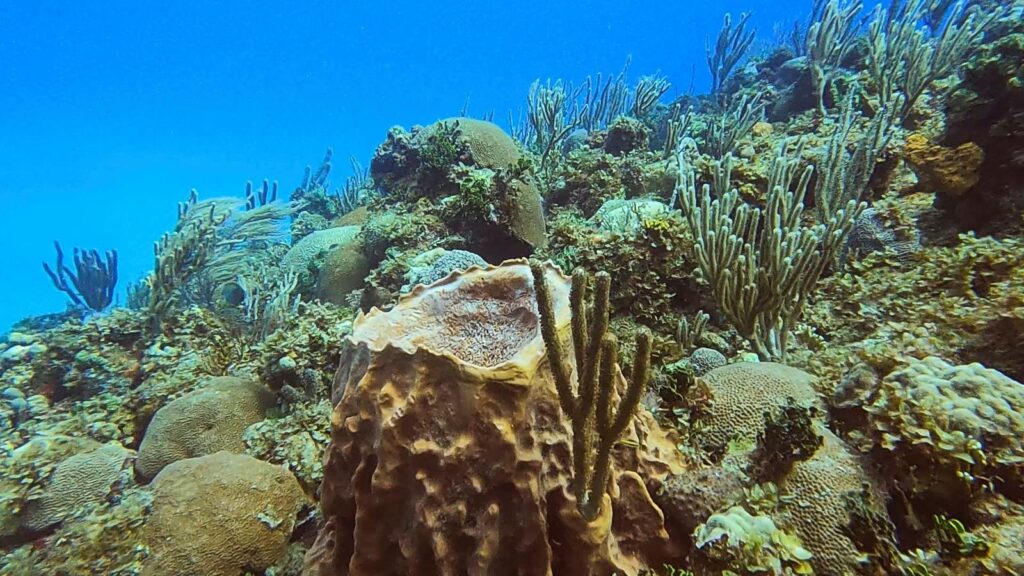Oxygen Loss In Oceans Predicted To Threaten Global Marine Ecosystems
Mar 18, 2023 | Pratirodh Bureau
FILE PHOTO: A view of a coral colony on the coast of Havana, Cuba. Low oxygen conditions on coral reefs could increase by upto 287 per cent by the year 2100, relative to now. Researchers say hypoxia is likely to become more common as global temperatures continue to rise and marine heat waves become more frequent and severe
Source: PTI
Using climate models, scientists have projected a substantial increase in cases of hypoxia, or low oxygen conditions on coral reefs, by the year 2100 under all warming scenarios. According to them, the increase ranges from 13 to 42 per cent under one scenario to 97 to 287 per cent under a more extreme scenario relative to now.
The researchers say that hypoxia is likely to become more common as global temperatures continue to rise and marine heat waves become more frequent and severe.
The international team of researchers, led by University of California San Diego’s Scripps Institution of Oceanography, US, captured the current state of hypoxia at 32 different sites around the globe, and revealed that hypoxia is already pervasive on many reefs.
While ocean deoxygenation has been well documented, which is the overall decline of oxygen content across the world’s oceans and coastal waters, hypoxia on coral reefs has been relatively underexplored.
Oxygen loss in the ocean is predicted to threaten marine ecosystems globally, though more research is needed to better understand the biological impacts on tropical corals and coral reefs. This study claims to provide an unprecedented examination of oxygen loss on coral reefs around the globe under ocean warming. It is published in the journal Nature Climate Change.
The authors found that hypoxia is already happening in some reef habitats now, and is expected to get worse if ocean temperatures continue to warm due to climate change. They also used models of four different climate change scenarios to project that ocean warming and deoxygenation will substantially increase the duration, intensity, and severity of hypoxia on coral reefs by the year 2100.
The analysis was led by marine scientist Ariel Pezner while she was a PhD student at Scripps Oceanography.
Pezner and colleagues used autonomous sensor data to explore oxygen variability and hypoxia exposure at 32 diverse reef sites across 12 locations in waters off Japan, Hawaii, Panama, Palmyra, Taiwan, and elsewhere. These sensors measured temperature, salinity, pH, and oxygen levels every 30 minutes.
Historically, hypoxia has been defined by a very specific concentration cutoff of oxygen in the water — less than two milligrams per litre (mg/L) — a threshold determined in the 1950s.
The researchers noted that one universal threshold may not be applicable for all environments or all reefs or all ecosystems, and so, they explored the possibility of four different hypoxia thresholds: weak (5 mg/L), mild (4 mg/L), moderate (3 mg/L), and severe hypoxia (2 mg/L).
Based on these thresholds, they found that more than 84 per cent of the reefs in this study experienced “weak to moderate” hypoxia and 13 per cent experienced “severe” hypoxia at some point during the data collection period.
As the researchers expected, oxygen was lowest in the early morning at all locations and highest in the mid-afternoon as a result of nighttime respiration and daytime photosynthesis, respectively.
During the day, when primary producers on the reef have sunlight, they photosynthesize and produce oxygen, said Pezner.
But at night, when there is no sunlight, there is no oxygen production and everything on the reef is respiring — which is breathing in oxygen and breathing out carbon dioxide — resulting in a less oxygenated environment, and sometimes a dip into hypoxia.
“This is a normal process, but as ocean temperature increases, the seawater can hold less oxygen while the biological demand for oxygen will increase, exacerbating this nighttime hypoxia,” said the study’s senior author, biogeochemist Andreas Andersson, Scripps Oceanography.
“Imagine that you’re a person who is used to sea-level conditions, and then every night you have to go to sleep somewhere in the Rocky Mountains, where the air has less oxygen. This is similar to what these corals are experiencing at nighttime and in the early morning when they experience hypoxia,” said Andersson.
“And in the future, if the duration and intensity of these hypoxic events gets worse, then it might be like sleeping on Mount Everest every night,” said Andersson.
Establishing baseline conditions will be “imperative”, the researchers said, by continued and additional oxygen measurements on coral reefs over different seasons and longer time scales, as a singular definition of ‘hypoxia’ may not be reasonable for all environments.
